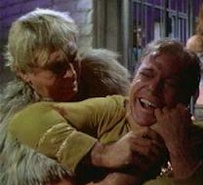
|
commentary
Eight myths about libertarianismby T. J. Nelson |

|
commentary
Eight myths about libertarianismby T. J. Nelson |

|
 ack in 1980, libertarian Murray Rothbard wrote a famous article titled
"Myth and Truth About Libertarianism" to address the misconceptions people
have about libertarianism. Since then, libertarianism has continued to inspire
anxiety among left-wing statists and social conservatives alike, which has led to
new, bigger, improved myths. Activists on all sides periodically bash what they see
as the libertarian perspective [1].
ack in 1980, libertarian Murray Rothbard wrote a famous article titled
"Myth and Truth About Libertarianism" to address the misconceptions people
have about libertarianism. Since then, libertarianism has continued to inspire
anxiety among left-wing statists and social conservatives alike, which has led to
new, bigger, improved myths. Activists on all sides periodically bash what they see
as the libertarian perspective [1].
But if they're going to bash it, they need to get their ideas about it straight. Otherwise they might inadvertently bash each other, leaving the libertarians standing all alone on the curb with nothing to do. So I would like to dispel some commonly held accusations.
One only has to read a small portion of Ludwig von Mises's 912-page Human Action or Murray Rothbard's 1,438 page Man, Economy, and State to know that this charge is totally without merit.
For more proof, check out the Cato Institute. No humor there. The fact is, anyone who tells a joke that is actually funny is not a true libertarian. Now, of course, this doesn't narrow it down much. Bill Maher, for example, calls himself a libertarian, and clearly none of his jokes are funny. But in fact he's a liberal.
His reasoning is that, since he is tolerant of gays, minorities, and so forth, therefore he is a libertarian. But as Ivo Vegter at the Daily Maverick points out, just because you think you're being tolerant does not make you a libertarian. Conservatives are dead right when they point out that “tolerance” is today's Orwellian term for “intolerant” and “unable to consider alternative points of view”—often to a degree that borders on fascism.
Some people mention H. L. Mencken and P. J. O'Rourke, but they are not true libertarians—they are more properly satirists. Many of our greatest intellectuals have been libertarians, and their writing sometimes tends toward dryness. But libertarians have such a finely developed sense of humor that their jokes, often several pages in length, are often mistaken for political pronouncements. In fact, the longest known joke in history starts on page 1009 of Ayn Rand's Atlas Shrugged and ends, six hours later, on page 1070, before it even gets to the punch line, when one listener starts screaming, “Let me out of here!!!”
Abortion violates the fundamental principle held by all libertarians, which is that one person's freedom stops where another's begins. Even though a fetus is not fully developed, there's no question that it is a living person, with a unique genome distinct from its mother. So the woman carrying it has a moral obligation to protect this defenseless individual.
The Washington Post claims that only 30% of libertarians are “staunchly pro-life.” Some may be reluctant to abandon the old idea that a woman has a “right to choose.” But no libertarian believes a person has a right to choose to kill another. We must conclude either that (a) not all libertarians have thought this through, (b) that 70% have not yet achieved full libertarian samadhi, or (c) the Washington Post is --gasp-- wrong.
In fact, as an issue, abortion has reached its sell-by date. One day people may look back at the killing of millions by abortion in almost the same way that we look back at the Nazi holocaust. An entire society choosing to kill a defenseless group of individuals out of convenience is indefensible by either libertarian or humanitarian standards.
A critical tenet of libertarianism is acceptance of personal responsibility. As far as responsibilities are concerned, becoming pregnant is one of the biggest.
Conservatives often criticize libertarians who are opposed to the drug war. Even Ayn Rand called libertarians “hippies of the right,“ man. I am not the best person to drone on about the drug war, which has turned some parts of America into something resembling a police state. At work I have a DEA license that allows me to buy controlled substances for scientific purposes, but I never use it even for that. It's inconceivable to me that someone would deliberately take a mind-altering substance.
But many people do. For libertarians the question would be whether selling narcotic drugs to another is a form of aggression. I suspect many would be willing to compromise on the purist view that prescription drugs should be freely available to anyone who wants to buy them. There are good arguments on both sides.
But for libertarians the issue is not about drugs per se. It's about the limits of government power. Murray Rothbard put it succinctly: libertarianism does not offer a way of life—it offers liberty. People should be able to choose what kind of laws they live under. Those who don't like them should be able to move to another state where the laws are different. With today's all-powerful central government, that's hard to do.
The Federal government should not be allowed to make or enforce laws. It should return to its Constitutional mandate to adjudicate disputes among the states, standardize the weights and measures, be our voice to foreign governments, and stop there.
But freedom scares people. They want the government to stop their neighbor from putting their car up on cinder blocks in their front yard. They want the government to stop inner city youths from destroying their lives with drugs. They want the government to pay for their children's education and to fix their teeth, to force all the houses to look the same, and to bomb the crap out of those bastards in that other country over there.

We all know, of course, that most of these things could be accomplished by covenants and contracts. But practically speaking, it's easier to let the government handle it. Unfortunately, governments have a distressing tendency create an ever-increasing body of laws and regulations. The more the state does for you, the more they own you. In a country where the state gets the exclusive right to present its point of view to children for twelve years, that can end in only one way: with life and death power over you.
In such a world, after thousands of seemingly trivial intrusions, all for the collective benefit, we find that it is the collective, not the individual, that has benefited, and it is the collective that decides what we do. We become mindless cells in a giant organism. Without freedom, there can be no right or wrong and no good or evil. Your life becomes meaningless—morally and spiritually empty—and the state can throw it away as it pleases.
The Soviet Union is the archetype of this idea. Josef Stalin called dissidents “weeds.” He and the other leaders of the USSR thought nothing of killing people by the million to further their ideology.
We have seen throughout history that as governments grow stronger, they invariably adopt this practice. In every case the state, and the leaders who clawed their way to the top, massacred its own citizens. For those who vote for this situation, one must conclude that they have a death wish.
Logically, if there are no borders, then the nation-state ceases to exist, and we have a one-world government. This is anathema to libertarians. Therefore, libertarians should believe that border controls are essential and should be strengthened until such time as governments disappear and the threat of one-world government is gone.
Some libertarians do believe in open borders. It's something that might even be considered in the distant future, but for now there is an overwhelming case for keeping the nation-state strong.
Few attacks on libertarianism have been as stinging as the claim that Noam Chomsky's ideas are a type of “libertarian socialism.” Having one's ideas associated with those of the learned professor from MIT is every philosopher's nightmare.
In fact, libertarian socialism is a contradiction in terms. Socialism by definition requires control of the individual by the state, which is the opposite of what libertarians stand for. “Libertarian socialism” makes about as much sense as “totalitarian anarchy.”
“I will never live for the sake of another man,” says John Galt in Atlas Shrugged (page 1069, line 35), and no, that was not from memory. This was this character's declaration of independence.
Unfortunately, this line appears after the character's 61-page, six-hour speech, which was so boring it put all the other characters to asleep. Even most of the readers of this book had started flipping pages, so almost nobody knows about this line. Too bad, it's a good one.
As another character in Atlas Shrugged said, “Run for your life from any man who tells you that money is evil. That sentence is the leper's bell of an approaching looter. So long as men live together on earth and need means to deal with one another—their only substitute, if they abandon money, is the muzzle of a gun.” (p. 412)
So, now that you mention it, maybe there's some merit to this myth.
Some libertarians advocate privatizing government altogether. The idea is that government always eventually becomes corrupt, and the best way to prevent that is to get rid of government altogether. It's a compelling idea, and the nice thing is that we can move toward it gradually, by privatizing things one at a time. That's not anarchy, just prudent common sense. We already have private security guards, commercial parcel delivery, and corporate-run prisons.
A guy named John Hawkins created a list of 7 reasons why he's a conservative and not a liberal. It's a nice list, but notice that freedom is not even on it. In some respects conservatives are almost as statist as liberals. They want government to control drugs. They admire the government's military, and so forth. For a conservative, national strength is a top priority. For a libertarian, freedom is the top priority.
These two goals are not contradictory. Freedom makes a country wealthy, which in turn allows it to become strong. Both conservatives and libertarians believe in the nation-state. Many libertarians go even further, and advocate a system reminiscent of the city-state. Competition among rival city-states would re-ignite the forces of cultural evolution, which become stagnant as countries get bigger. Whichever city-state became the wealthiest would see its ideas spread to the others. History proves that this would lead to the spread of freedom.
This myth is promoted by statists who think that being generous with other people's money is a form of unselfishness. Too bad most of that money is spent on ... you guessed it ... programs that increase dependence on the state. Which is, in fact, the real reason liberals want the government to spend so much money. They don't like being called communists—for understandable reasons—but ask them about the saying “From each according to their means; to each according to their needs” and they immediately nod in agreement. They want the government to “help“ them.

What this really means is they want government to use its power to take stuff away from somebody else and give it to them. They don't want to look too closely at this money, so they try to imagine that the people from whom the money was stolen were somehow “bad” or “greedy” to have had it in the first place.
Then they wonder why there never seem to be any jobs, and why all these terrible things keep happening in the world. To face the truth would mean accepting that they are complicit in crimes committed by the state.
Libertarianism benefits the poor, not just spiritually by setting them free, but economically as well. A rising tide lifts all boats. Back when the USA was a free country based on libertarian principles, we were by far the richest, most vibrant, freest, and most creative country in the world. Only by returning to our libertarian roots can we regain that.
But libertarians believe you're not being generous if the government takes resources away from you at gunpoint and uses them to support causes that are morally repugnant to you. Most of these programs have no effect but to make government bigger and less responsive. But because the government gets away with it, they continue.
Sometimes libertarians can be are defined by who attacks them. New Jersey governor Chris Christie called libertarianism “a very dangerous thought.” Rino John McCain called libertarians like Rand Paul who opposed the NSA spying “wacko birds.”
With opponents like these, it's no wonder that libertarianism is exploding in popularity.
[1]. A good example is this article where a commentator approvingly quotes former Yaron Brook, a former sergeant in the Israeli military, who claims that anarcho-capitalist libertarians hate Israel and support Hamas.

